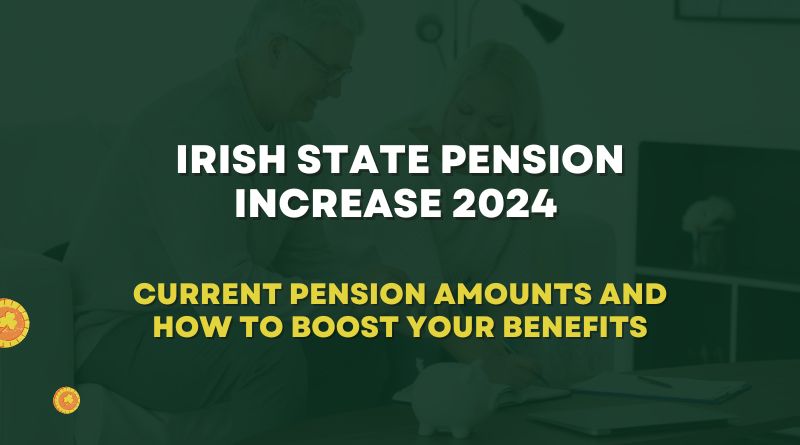Irish State Pension Increase 2024, giving retirees more options and flexibility. If you’re approaching retirement or thinking about your future, it’s important to know about these updates.
The State Pension has been boosted to offer better support to those who qualify. New rules now let people increase their pension by working until they’re 70. Let’s explore how much the pension has gone up, what types of pensions are available, and how you can make the most of your retirement benefits.
Table of Contents
State Pension Increase
Starting January 1, 2024, the Irish government has made some changes to the State Pension system that will benefit many taxpayers. One key change is that people can now choose to start claiming their Contributory State Pension at age 70 instead of the previous age of 66.
By working longer, retirees have the chance to boost their pension payments. This is a great opportunity for those who began contributing to their pension later in life or who simply want to increase their retirement income.
Previously, the pension could only be claimed at age 66. Now, by delaying retirement, individuals can receive a higher amount, giving them more time to contribute to their social insurance and potentially enjoy a bigger payout when they retire.
Types
Ireland provides two main types of State Pensions: Contributory and Non-Contributory. Understanding the difference between these can help you figure out which one you might be eligible for and how to get the most out of your benefits.
Contributory State Pension
The Contributory State Pension is for people who have paid enough into the Pay Related Social Insurance (PRSI) throughout their working years. The great thing about this pension is that it doesn’t depend on how much money you have or your current income. It’s based solely on your PRSI contributions. Plus, with the recent updates, you can choose to wait until you’re 70 to start claiming the pension, which means you could get a higher amount.
Non-Contributory State Pension
If you haven’t made enough PRSI contributions, you might still be eligible for the Non-Contributory State Pension. This pension is based on your income and assets, so it’s means-tested. Even if you didn’t qualify for the Contributory Pension, you can still get financial support during retirement. The government has also set up additional plans to help those over 66 who don’t qualify for the Contributory Pension.
While some taxes might apply to these pensions, individuals with no other income may be able to get tax exemptions.
How Much?
The amount you receive from the State Pension depends on when you start claiming it. Here’s a simple overview of the payments beginning in January 2024:
| Age | State Pension Amount |
|---|---|
| 67 Years | €290.30 |
| 68 Years | €304.80 |
| 69 Years | €320.30 |
| 70 Years | €337.20 |
The table shows that your pension amount grows each year after you turn 67, hitting a peak of €337.20 per week by age 70. This gradual increase encourages people to keep working and pay into their social insurance for longer, which leads to a more comfortable retirement.
Eligibility Criteria
To qualify for the State Pension, there are specific requirements you need to meet for either the Contributory or Non-Contributory Pension. Here’s what you need to know:
Non-Contributory State Pension
- Age: You must be 66 or older.
- Residency: You need to be an Irish citizen or have lived in Ireland regularly.
- Means Test: You have to pass a means test, which looks at your income and assets.
Contributory State Pension
- Age: You can start receiving it from age 66.
- PRSI Contributions: You need to have paid enough PRSI contributions over your working life.
- Timing: Your contributions must have started before you turned 56.
These guidelines help ensure that people who have paid into the system get their benefits, while those who haven’t still receive support through the Non-Contributory Pension.
How to Boost Your State Pension
If you want to get the most out of your State Pension, here are some simple tips to help increase what you receive:
Delay Your Pension Claim
One easy way to boost your pension is to wait until you’re 70 to start claiming it. By staying in the workforce and continuing to pay into PRSI, you can significantly increase your weekly pension amount.
Make Extra Contributions
If you’re still working, think about making extra PRSI contributions. This is especially helpful if there are gaps in your contribution history or if you started contributing later in life.
Buy Extra Years
If retirement is just around the corner and you don’t have enough contributions, you might have the option to buy extra years of PRSI contributions. This can help you qualify for a higher Contributory Pension.
Other Financial Assistance Programs
If you don’t qualify for the Contributory Pension, don’t worry—there are other financial aid options in Ireland for retirees. These programs can help boost your Non-Contributory Pension and offer extra support as you enjoy your retirement.
In summary, the 2024 increase in the Irish State Pension is a great chance for those approaching retirement. By understanding these changes and taking action, you can make the most of your retirement income and secure a more comfortable future.
FAQs
What’s the New Maximum State Pension in 2024?
As of 2024, the highest State Pension you can get at age 70 is €337.20 per week.
How Can I Boost My State Pension?
You can increase your State Pension by waiting until you’re 70 to claim it or by making extra PRSI contributions.
Who Can Get the Contributory State Pension?
To qualify for the Contributory State Pension, you need to have enough PRSI contributions and be at least 66 years old.
What Is the Non-Contributory State Pension?
The Non-Contributory State Pension is a means-tested payment for people who don’t have enough PRSI contributions.






